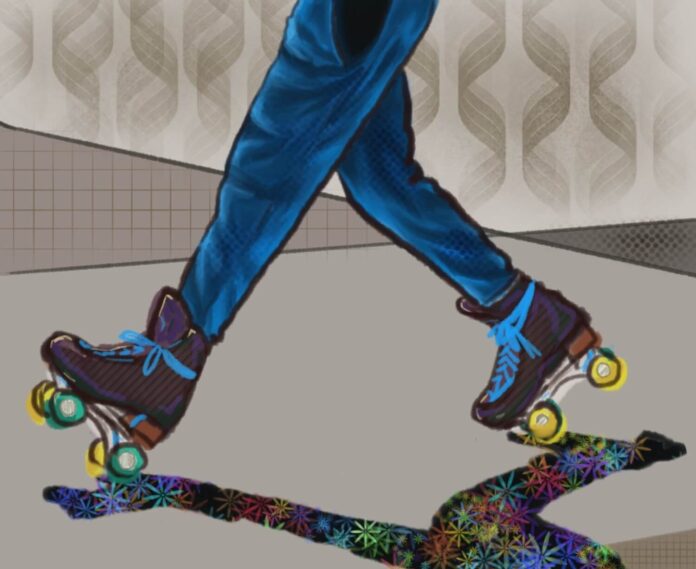Content warning: The following article discusses depression.
Feb. 23, 2024: instead of the high static friction between my shoes and the ground, there are wheels underneath my feet. It’s my first time roller-skating in 10–12 years (or maybe even longer), and I am terrified. I verbalize this a lot while learning the basics of roller skating — my teacher (and friend) is being quite gracious. As I get used to the feeling of wheels underneath my feet, I learn to accept the motion. There may not be so much static friction underneath my feet, but I am still ultimately in control (so long as I keep my knees bent, arms forward, maintain a neutral spine and absolutely 100 percent do not fall down backwards). Graceful? No. Alive? Yes.
Despite all that fear I had while learning, roller skating was not the only part of that day that filled me with terror and dread. I’ve dealt with depression (mostly not professionally diagnosed) on and off since I was 12, maybe 13. Coming into the Spring semester, however, I truly thought that I would be at peak performance — I was part of a great newspaper team, I had excellent professors who would help me succeed in my classes, all of which I was excited to take and I was blessed with lovely friends. Instead, depression came back with a vengeance, and while I tried to push through, it took its toll.
Depression for me operated through a few major channels. One was the fatigue — class seemed to tire me out, no matter how interesting the content was. Even activities and subjects I loved, like mathematics, felt truly unbearable as time went on. However, perhaps more importantly, depression also messed with the way I understood myself. It was as if my brain broke away from my experiences of the world and people around me. I became convinced that everyone I was friends with hated me, and I would be forever destined to push people away.
The worst part was that my brain gaslit me into believing I was alright. Every time someone would ask me a question about how I was doing, I’d answer “I’m fine,” even when I was clearly not. It was almost instinctual — of course I was fine; my experiences were obviously normal. I looked healthy, I could lift weights and I could (from the outside) manage my course load — what else did people want from me?
The nadir of my depression started Thursday, Feb. 22 — one day before I learned to roller-skate. For some reason, at 2:00 p.m. that day (in the middle of class, so disrespectful!), a switch flipped, and I gave up on my life. My world was over; no one wanted to be around me, everyone secretly hated me and I was never going to amount to anything. It felt like my mind and body were degrading in front of my eyes — and no matter how much I tried to maintain some semblance of energy and normality, I thought everyone around me knew this and distanced themselves from the husk of an individual I was becoming. I lost all my appetite; my body finally accepted what my brain was telling it and decided starvation was the only natural response. Sleep did not help either (as it had for previous episodes of depression); when I woke up the following morning, it took all my remaining willpower to get out of bed, 30 minutes after I woke up.
It would be a lie to say roller skating fixed my depression — but skating quickly became a way to distract myself from the pit I continued to fall deeper into. To be frank, I am a bad roller-skater — I fall often, and wheels underneath my feet will always be foreign to me. However, it was precisely this risk of falling and the physicality of skating that kept me grounded. My brain wasn’t conjuring up an elaborate series of lies, determined to make me curl up in the fetal position and let the world pass me by. It simply couldn’t, not when I had to pay attention to the physical. My entire body was laser-focused on making sure I didn’t fall and that, if I did, I would be able to get myself back up.
Even as my symptoms worsened over the weekend, I realized that, even if I could accomplish nothing on a given day, at least I would be able to successfully roller-skate. The obligations of academics, social relationships and the newspaper, while they were still very much present, absolutely had to take a back seat to my sense of self-preservation. My brain might have felt as if I already were dead, but roller skating reminded me that, not only was I still alive, but I had the power to keep myself alive.
Now, thankfully, I am in a better place. Shortly after learning to roller-skate, I flew home to the Bay Area (with sufficient apologies to the editors of a story I was working on), obtained depression medication and started the long process of rediscovering myself, free of (most of) the lies my brain told me. I can’t say for certain that roller skating was the sole reason I was able to function throughout this particularly difficult time of my life — the grace of my friends and fellow editors at the paper, as well as the small part of my brain that was still capable of rational thought, kept my spirit from vanishing completely — but roller skates helped me feel one deep human urge as I felt my world collapsing. And that made all the difference.
Contact Avinash Iyer at iyera@oxy.edu
![]()































